Curricular Ties
The Antioch Farm as a Learning Laboratory
The Antioch Farm plays an indispensable role in the mission of Antioch College, and our community of students, faculty and staff value the Antioch Farm as an integral component of campus sustainability as well as a learning platform for the community. The Farm is a learning lab and is used by faculty across all four of Antioch’s major areas of study for teaching and research. See below for examples of the many ways the Antioch Farm enhances learning in the classroom.
- Sciences
- Social Sciences
- Experiential Courses
- Humanities
- Arts
- Independent Research
Sciences
BIO 210 Botany – This course investigates the wide variety of plant forms and the molecular mechanisms that generate them. It provides a conceptual framework for understanding plant development that includes an evolutionary perspective. Ecological principles are used to examine plant population and community processes. Special attention will be given to plant/animal interactions such as pollination, dispersal, and herbivory. The lab component will use local habitats to gain hands-on experience in field observations and data collection and analysis. The Farm is used for botanical surveys and multiple labs (image 1220, in Botany folder, under kim landbergen, shared drive)
- LAB: Autumn Aster comparative morphology: Students collect and dissect native blooming Autumn members of the Aster family, and compare these to domesticated varieties found in the Antioch Farm (Cosmos, Tickseed, Marigold, Zinnia).
- LAB: Comparative root anatomy and nitrogen-fixer nodulation: Students collect wild and domestic species from the Antioch Farm to study and compare root types and their function (fibrous, tap, prop, adventitious, etc.). In addition, excavation of example legume crops allows for examination of the presence of N2-fixation nodules on legume roots.
ENVS 105 Introduction to Environmental Science – Farm Manager Kat Christen talks with the Environmental Science class about ecological agriculture and helps coordinate on farm student plantings and projects.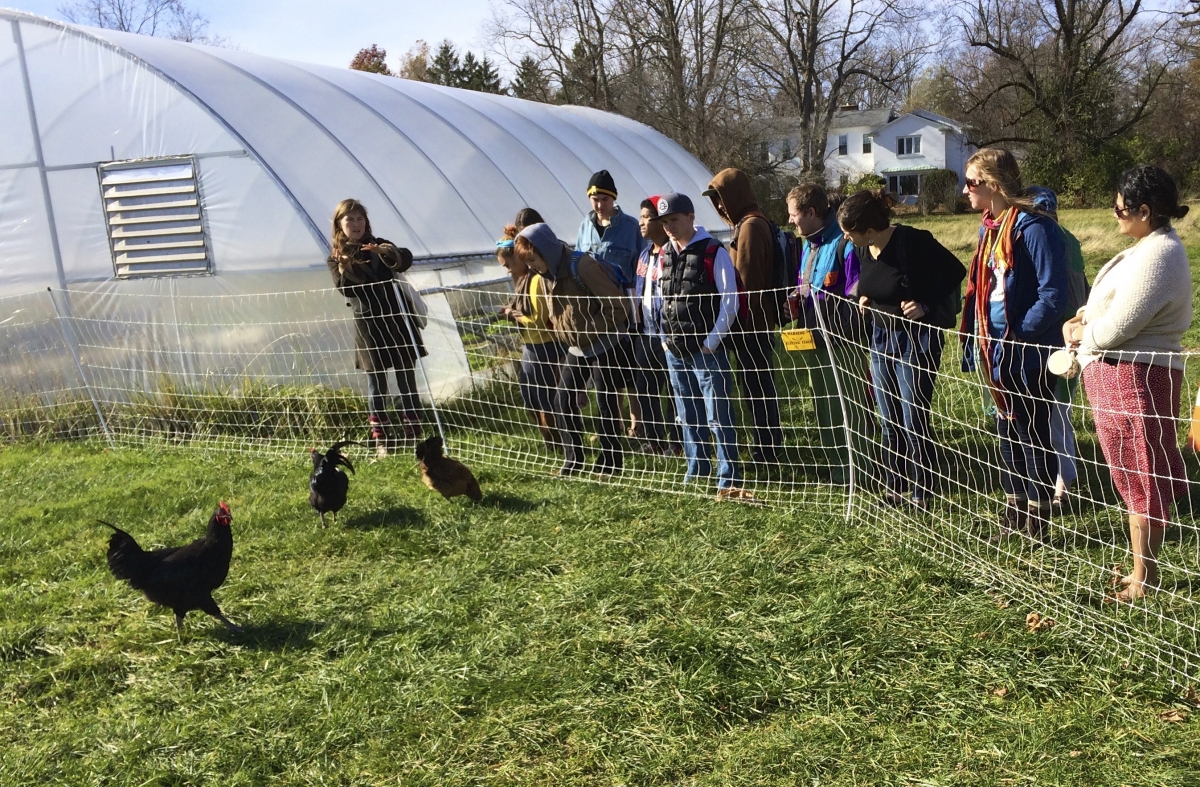
ENVS 230 Soils: A Living System – This course explores the nature, properties, and use of soil to capture its value and to understand better its critical role as a foundation of life. It is an introduction to soil organisms, and includes interactions between organisms, their processes, and metabolism with a major focus on microorganisms. This course also introduces students to basic concepts of soil science and the soil’s contribution to the functions of natural and anthropogenic ecosystems. It provides an overview of soil’s morphological, physical, chemical, and biological properties, and how these interact to form a soil with unique characteristics and ecosystem function. Students discuss soils of the world from the perspective of soil taxonomy, the processes that form these soils, and land use properties specific to each soil order. Current issues regarding the proper use and management of soils are investigated. The Antioch Farm is used to collect and analyze soil samples.
ENVS 310 Soil Science – This class uses the Antioch Farm to collect and analyze soil samples, with multi-week labs focusing on soil chemistry, fertility, structure, and land use on campus, on the Farm, and in the Glen 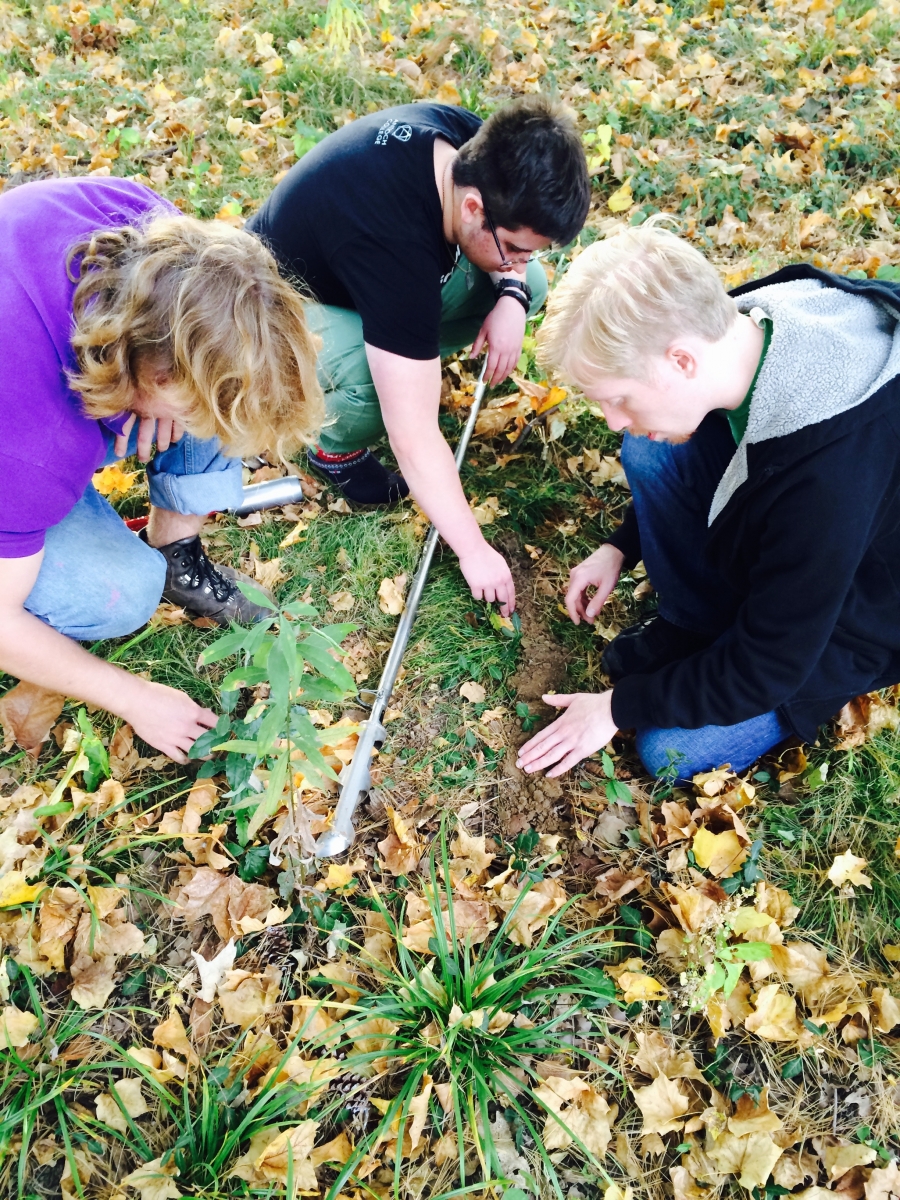
ENVS 319 Hydrology – In this class, The Antioch Farm is utilized for multiple labs on campus stormwater while other labs took place in the Glen (in-stream)
ENVS 339 Ecological Agriculture – This course focuses upon the science of ecological agriculture and the importance of understanding and comparing the current methodologies of agriculture with appropriate alternatives. This course will also focus on understanding the ecological concepts that are of universal application in all bioregions where agriculture is practiced. A special emphasis is be placed on alternatives to non-sustainable systems that rely too heavily on chemicals and irrigation, such as the development of systems that mimic native ecosystems. ENVS 339 uses the Antioch Farm on a weekly basis to investigate and apply course content to the practical application of growing crops. Weekly farm labs cover operations, biology, soils, pest control, fertility, permaculture, and more.
ENVS305/ENVS339 Ecology and Applied Ecology – courses Grant: Propolis Foundation. Summary: Purchasing, planting native flowering prairie plants on western Farm. Planning and Launching Phase I: Pollinator Path
BIO160 General Biology II and Lab – Dr. Savitha Krishna, Assistant Professor of Biological Sciences, brought her students to the Farm to support their indoor studies on worms and collected earthworms.
BIO230 Genetics – Dr. Sarah Fritz used the Farm as a lab, connecting classroom genetics to the practical application of on farm chicken breeding.
.jpg)
SCI 370 Zoology: Advanced Special Topics in Sciences – Insect collection. Pre-pollinator path insect sampling.
Social Sciences
PECO 315 Environmental Economics – Dr. Sean Payne’s class utilized the Farm as a local case study for land use decision, environmental valuation techniques and spatial economic relationships. The class also discussed zoning regulation during a study of cost-benefit analysis. In addition, his Introduction to Economics class created a student production line to convey the ideas of productivity flowing to marginal productivity.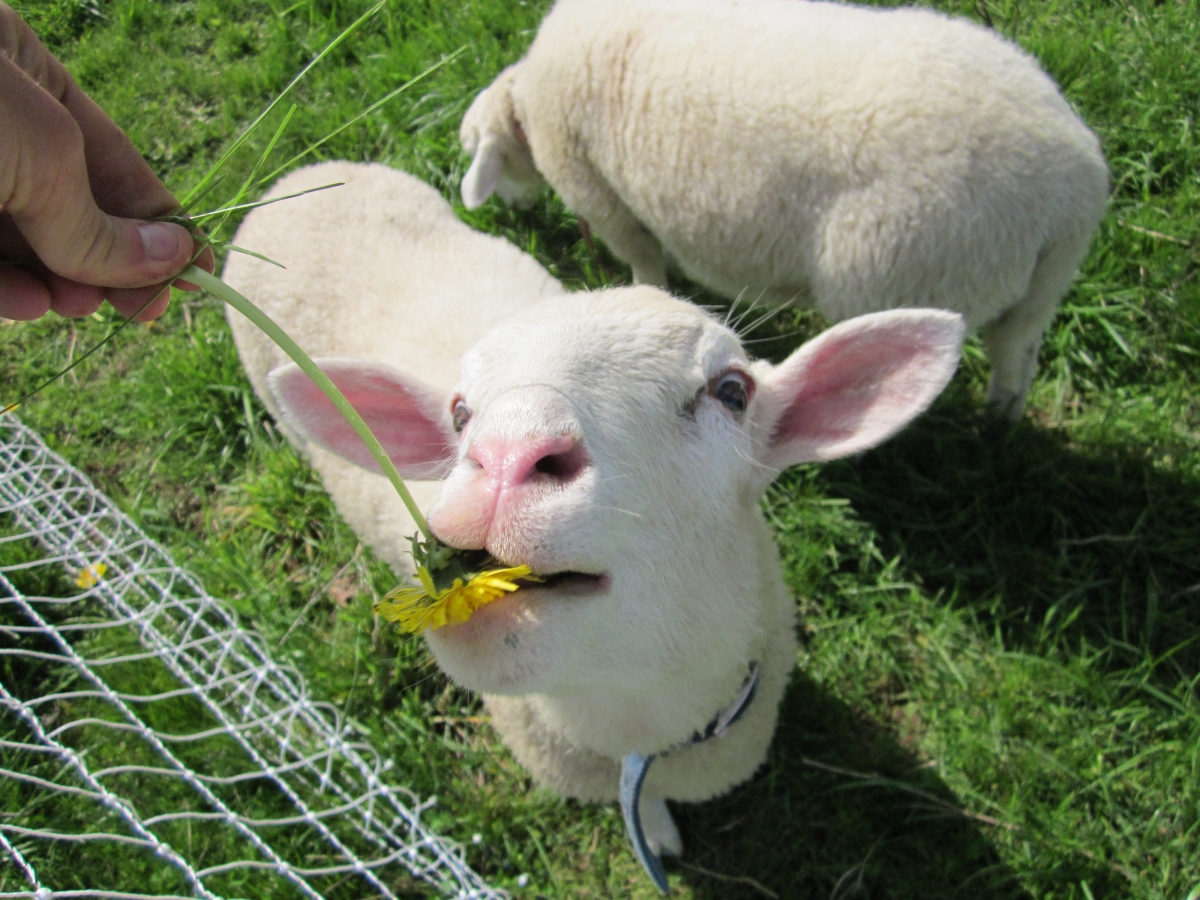
PSYC 240 Somatic Psychology – Dr. Deanne Bell’s class utilized the Farm to discuss the relationship between raising farm animals and eating them, the difference between having an intimate relationship with animals for sustenance and nutrition versus being alienated from the animals and the earth and eating industrially processed food.
Humanities
PHIL229 Eastern Philosophy – Dr. Lara Mitia;s class utilized the Farm to study animal meditation and animal consciousness.
PHIL105 Epistemology – Dr, Lewis Trelawny-Cassity, Assistant Professor of Philosophy, brought his Class came to the Farm to discuss Aristotle’s idea of “plant souls” after Kat led students in a planting of wild onion ramps in the food forest.
Experiential Courses
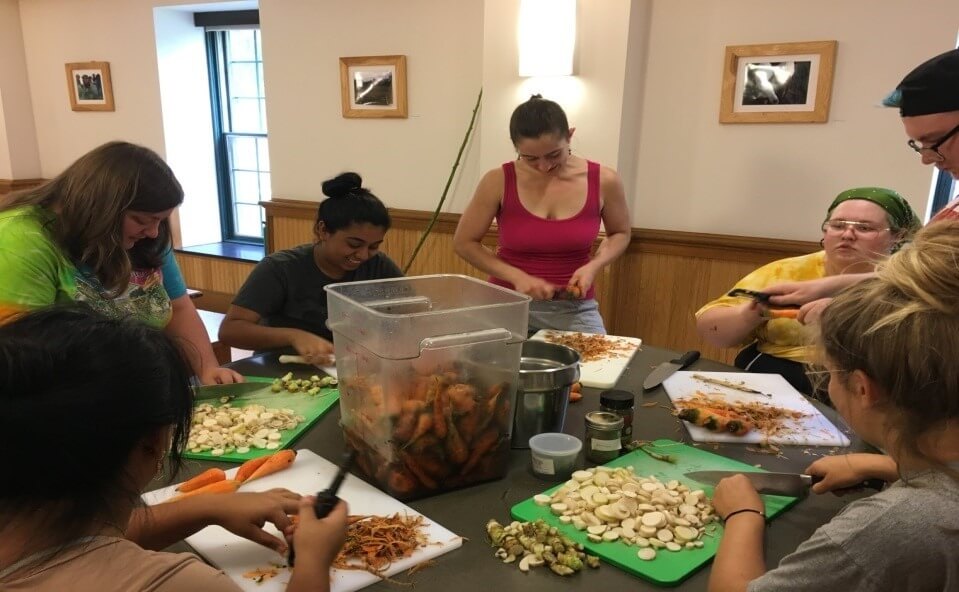
EXPR 140 The Antioch Harvest: Seed-saving, Canning, Fermenting, and Preserving – In this course, students harvest seeds, fruits, nuts, vegetables, and herbs from the Farm for use in learning food preservation techniques.
EXPR 240 Reskilling, Sustainability and Community – In this course, the Antioch Farm is used for plowing, composting, beekeeping, biochar, foraging, animal care, planting, harvesting, and other demonstrations.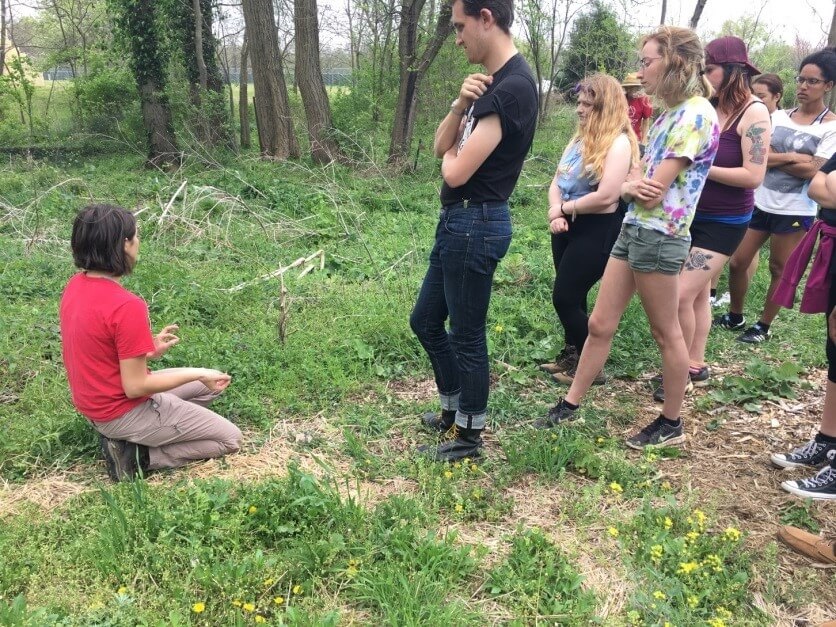
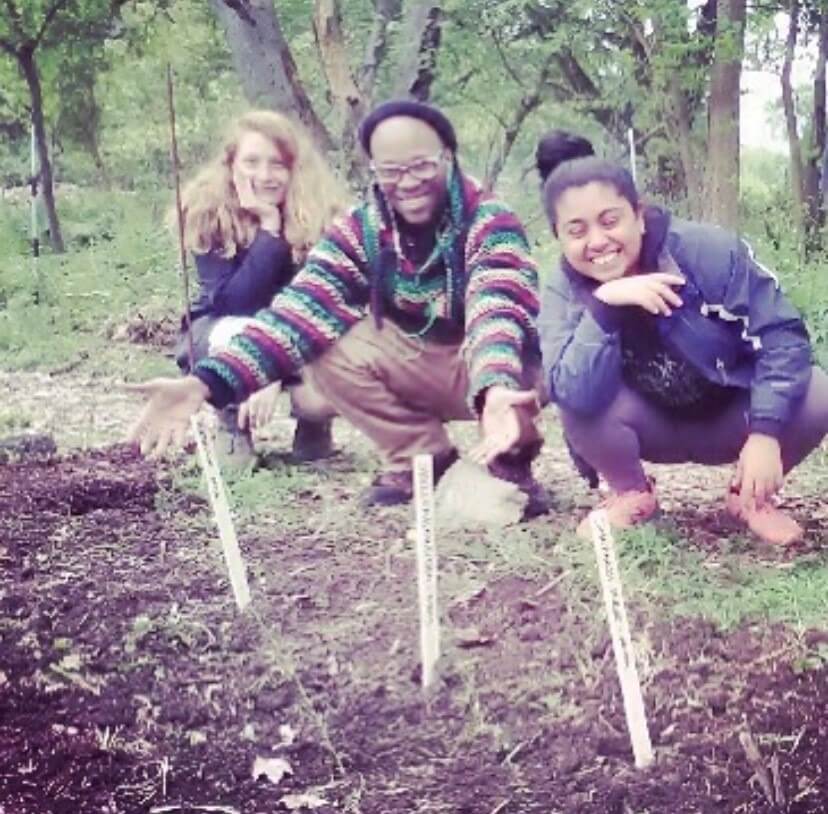 EXPR 340 The Antioch Apothecary: Teas and Tinctures, Syrups and Salves – Students planted a sheep apothecary garden, planted and collected herbs, studied plant medicine, and learned to make tinctures, salves, and other types of plant medicine.
EXPR 340 The Antioch Apothecary: Teas and Tinctures, Syrups and Salves – Students planted a sheep apothecary garden, planted and collected herbs, studied plant medicine, and learned to make tinctures, salves, and other types of plant medicine.
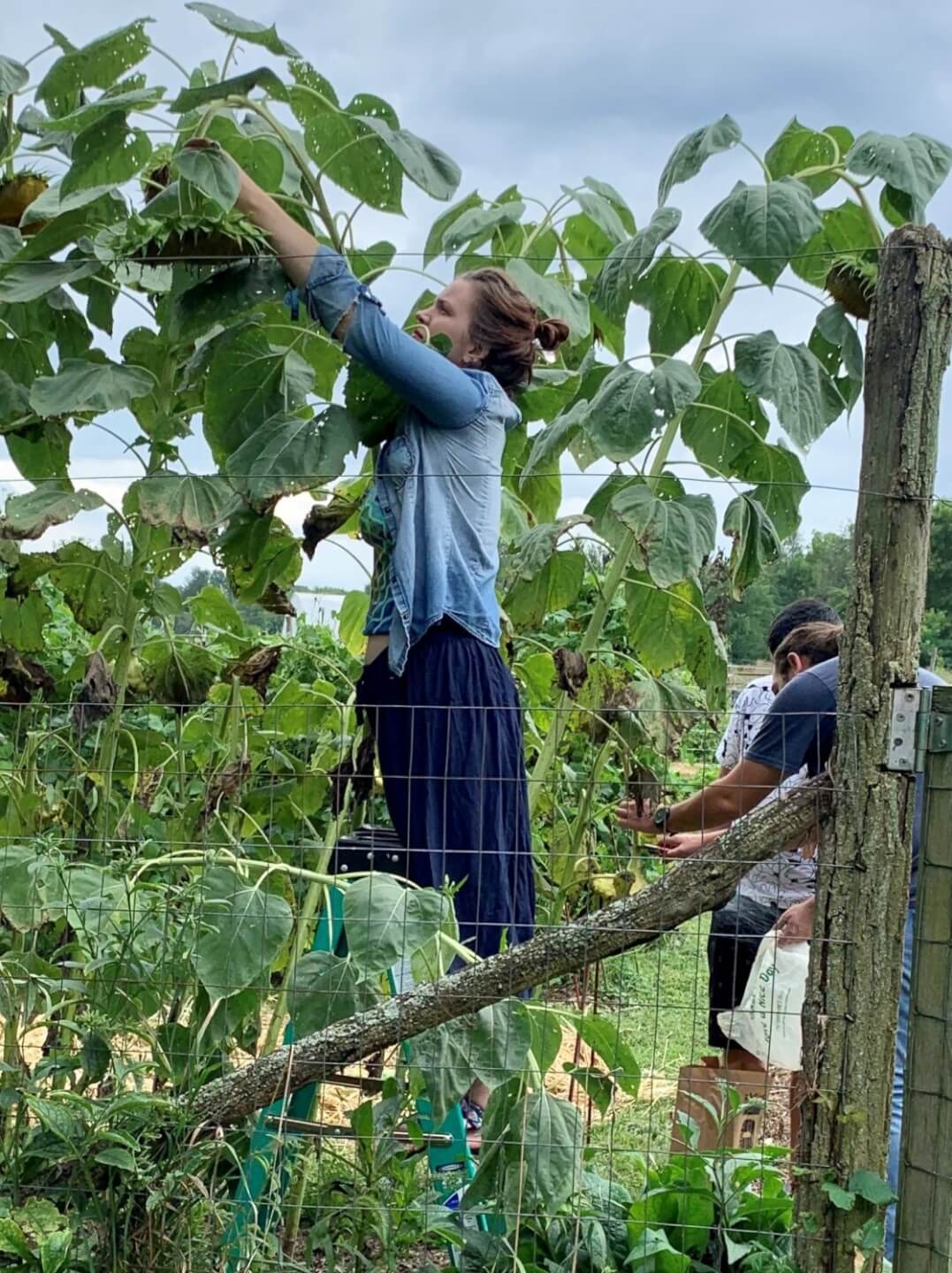
EXPR 341 Seed Sovereignty and Citizen Action -In this course, students collected bean and corn seed from the Three Sisters Garden on the Antioch Farm, planted by Dr. Kevin McGruder’s Ohio Stories history class. They collected seed from a variety of other vegetables and herbs, including dill from the Safe Passage Garden, and learned winnowing, wet and dry processing techniques, and preventative methods for avoiding cross-pollination in seed-saving.
Arts
Media students often utilize the Farm for media assignments.
chicken kitchen compost from Arts at Antioch College on Vimeo.
In 2016, Ellie Burck ’18 explored the pilot program of our solar sheep for the Antioch Word, a student-made podcast at WYSO. Ellie talks with a student Farm worker about the process of caring for sheep that would eventually be prepared and eaten in the campus Kitchens. Listen to the podcast here.
Dr. Sara Black, working with a small collaborative group of artists, architects, students, and staff created a series of weekend workshops to design and implement an International Tea Garden from the former Antioch Japanese Tea Garden. The Tea Garden in located on the Northeast portion of the farm.
Independent Research Projects
Independent Research Projects often utilizing campus resources and include efforts such as reforestation efforts, land management, tree health, carbon sequestration, and vermicomposting. Examples of various student research projects are listed below.
SCI297 – “Characterization of campus soil carbon storage and water infiltration: A study of soil properties and soil structure”
– Student researcher: Anthea Van Geloven ‘17, Summer 15. Main campus
All photos above courtesy of Dr. Kim Landsbergen, Associate Professor of Biology and Environmental Science
SCI297 – “Surveying native bee diversity on Antioch’s campus” – Student researcher: Cherokee Hill-Read, ’17, Summer 15, Pollinator biodiversity survey, Main campus, Farm (South Campus Pollinator Path) pasture 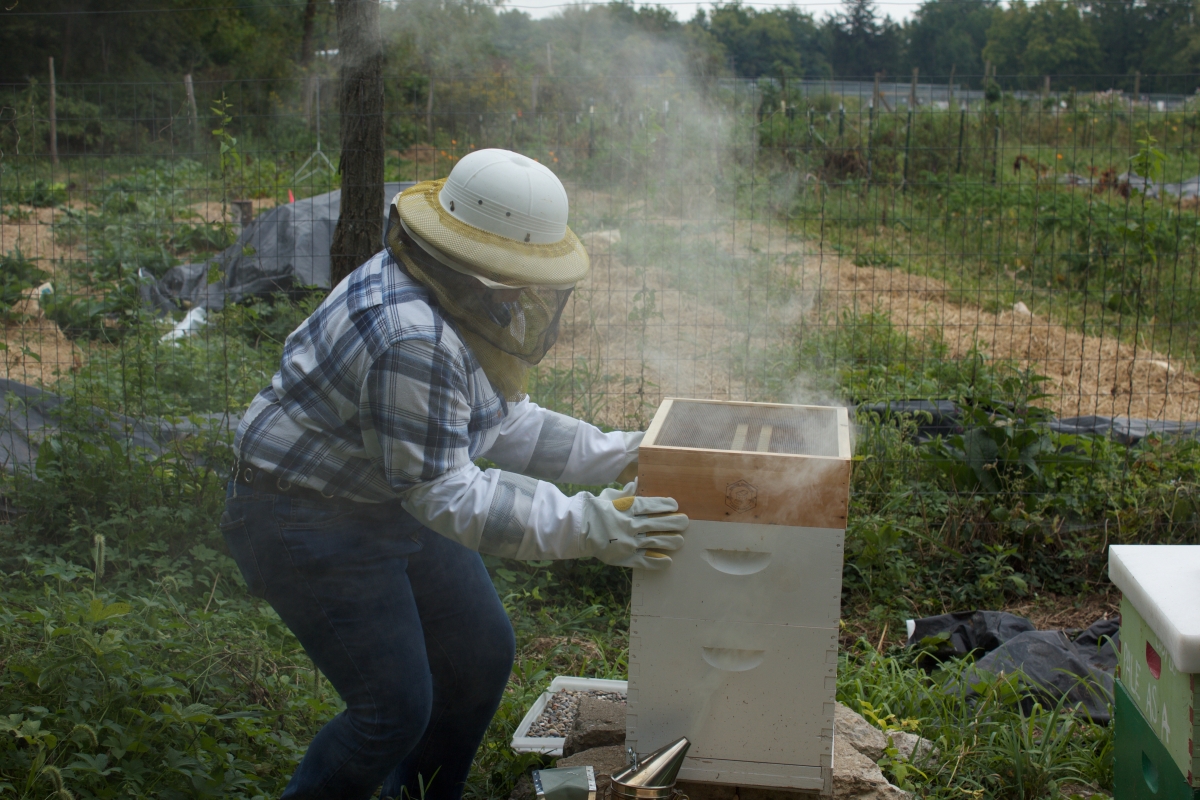
SCI297 Beekeeping – Pollen and nectar collecting behavior of the honey bees on the Antioch Farm. – Student researcher: Julia Navarro ‘16.
